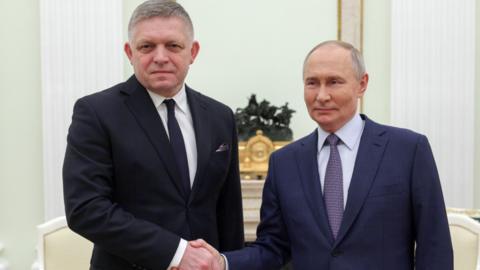His visit marks a departure from the EU's Common Security and Defence Policy which all member states are expected to abide by.
Under this framework, the EU has imposed multiple rounds of sanctions against Russia since Putin launched the full-scale invasion of Ukraine in February 2022.
Only Hungarian Prime Minister Viktor Orban - another Putin ally - and Austrian Chancellor Karl Nehammer have broken ranks with their EU counterparts to travel to Moscow.
"Top EU officials were informed about my journey and its purpose... on Friday," Fico wrote on Facebook.
He added that Putin had confirmed he would be willing to continue to supply gas to Slovakia, although the Slovak leader said this would be "practically impossible" with Ukraine refusing to renew the gas transit deal.
Fico, who survived being shot earlier this year, also said he had discussed "the possibilities of an early, peaceful end of the war" and mutual relations between Russia and Slovakia.
Kremlin spokesman Dmitry Peskov told reporters it was a "complicated situation", adding Russian gas is "necessary for the normal operation" of certain European countries' economies.
Fico's visit has gone down badly with opposition parties at home and with Slovakia's neighbouring EU and Nato ally, the Czech Republic.
Czech Foreign Minister Jan Lipavsky said his government had secured energy independence from Russia, and he was thinking of Ukrainians who could not spend Christmas with their loved ones because of Putin.
In Bratislava, Michal Simecka of Progressive Slovakia said Fico had made his country a tool for the Russian leader's propaganda and his trip was a "disgrace for Slovakia and a betrayal of national interests".
Erik Kalinak, an MEP for Fico's Smer party, defended the prime minister's visit, saying he was merely trying to secure cheap gas imports for Slovakia.
The visit was also defended by the environment minister Tomas Taraba and the far-right Slovak National Party.
